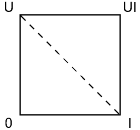Home
> urticator.net
Search
About This Site
Domains
> Glue
Stories
Art
Memes
The Mind
The Body
Language
Philosophy
> Strategies
Other
Other (2)
Anti-Consumerism
Environment Free of Distraction
> Time
Easy Deflection
Flexibility
No Eking
Voluntary Simplicity
Happiness
Mind Maps
Journaling
Too Much Is Eventually Enough
Deliverables
How Much Time?
Not Enough Time
Free Time
Routine
Attention
|
> Urgent vs. Important |
Urgent vs. Important
The more I think about it, the more I like the idea of contrasting (juxtaposing) things that are urgent with things that are important. I mentioned the idea once already, in Methods of Choosing …Speaking of things that are important, the above reminds me of an unfortunate time allocation behavior I read about somewhere or other, namely, working on things that are urgent to the exclusion of things that are important.
… and then I was reminded of it again, in Indecision, when I was discussing the number of urgent things.
One thing to notice is that being urgent and being important aren't extremes, two ends of one dimension; they're completely separate dimensions. It's possible for things to be both urgent and important, and for things to be neither urgent nor important. On the other hand, if something is both urgent and important, it's pretty clear that you ought to take care of it right away; and if it's neither, it's pretty clear that you ought to ignore it. So, if you have some things to do, and aren't sure what order to do them in, they probably do lie along a single dimension, like so.
Actually, we might as well be thorough, and change coordinates from urgency and importance to, say, priority and stridency. That's fun to think about, but it's hard to get the details right. For example, I doubt the coordinate change is an exact 45-degree transformation; it probably isn't even orthogonal, or linear.
Anyway, the main point I wanted to make here has to do with the word “urgent”. It's a nice Latin word, of course—it's the present participle of “urgeo”, just as “important” is of “importo”—but that doesn't really lead anywhere. The dictionary definition is more productive.
Insistent or importunate; earnest: urgent pleas.
The phrase “insistent or importunate” doesn't suggest much of anything to me when it's applied to things, or to pleas, but when it's applied to people, all of a sudden another word comes to mind: “pushy”. Things that are urgent are things that are pushy, that push your buttons to try and get you to take care of them … and that, as I argued in Reaction Against Button-Pushing, should immediately make the things suspect!
From there it's just a small step to the main point I wanted to make, which is that the difference between things that are urgent and things that are important is exactly the same as the difference between bad memes and good memes. Here's a nice description of the latter, from that essay I just mentioned.
Good memes are part of the infrastructure, like the genes for proteins that catalyze metabolic processes. They aren't strident, and don't tend to cause their own immediate replication; instead, they perform useful functions in concert with other memes, and are only replicated as part of a large, passive body of information. Bad memes, on the other hand, are literally like viruses. They're strident, tend to cause their own immediate replication, and don't do anything useful.
So, it all comes back to one of the reasons I started this site: the good.
Finally, I'd like to qualify what I said a minute ago, that anything that pushes your buttons should be suspect. Every button we have is there for a reason. However, the world we live in is so calm and civilized, and so far removed from the world we're adapted to, that most of the button-pushing we experience is nonfunctional, ranging from random noise to other people trying to exploit us. And yet, there are still times when the buttons are pushed for the right reasons. If you're hungry, and you go into the kitchen and see a nice juicy peach, it'd be pretty stupid to think “well, that pushes my buttons”, and be suspicious of the peach … obviously you should just eat it.
It's an interesting problem, trying to draw the line between good and bad button-pushing, but I'm not going to say any more about it here, except to suggest that it would be helpful to understand the reasons why the buttons exist.
See Also
@ September (2004)
